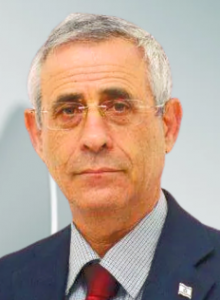 Dr. Mordechai Kedar is an Israeli scholar of Arab and Islamic culture and a researcher at Bar-Ilan University. He served for 25 years (1970–1995) in Israeli Defense Force Military Intelligence, reaching the rank of lieutenant colonel. As an academician, he specialized in Islam, Islamic groups, the political discourse of Arab countries, the Arabic press and mass media, and the Syrian domestic arena. He is fluent in Hebrew, Arabic, and English. He is described as “one of the few Arabic-speaking Israeli pundits seen on Arabic satellite channels defending Israel.”
Dr. Mordechai Kedar is an Israeli scholar of Arab and Islamic culture and a researcher at Bar-Ilan University. He served for 25 years (1970–1995) in Israeli Defense Force Military Intelligence, reaching the rank of lieutenant colonel. As an academician, he specialized in Islam, Islamic groups, the political discourse of Arab countries, the Arabic press and mass media, and the Syrian domestic arena. He is fluent in Hebrew, Arabic, and English. He is described as “one of the few Arabic-speaking Israeli pundits seen on Arabic satellite channels defending Israel.”
We are honored to have him visit us in San Diego and deliver presentations to students and adults alike.
Understanding our Arab Neighbors
through their Language & Culture
Brutal acts of terrorism and frightening threats of nuclear and unconventional weapons attack have brought the Arab nation to the forefront of the international arena. Why are Arabs attacking Western (and Jewish) targets? Why can’t we seem to find a common language?
“Mastering the Arabic language and learning about Arab history and culture and religions is a crucial condition for understanding the Arab world and the Arab mind-set,” says Dr. Mordechai Kedar, a lecturer in Bar-Ilan’s Department of Arabic who is also a research associate in the University’s Begin-Sadat Center for Strategic Studies.
“The key to understanding Arab societies is to look at the world through their point of view,” says Kedar. “The problem is that the Western world looks at the Arab world through a Western perception, ignoring the fact that Arab societies think, feel, talk, and therefore act in a totally different way.”
It is important to realize, says Kedar, that while Western values encompass individualism, freedom, and sexual openness, Middle-Eastern populations encourage group-thinking, strong moral codes, and the importance of history and religion.
Kedar refers to the present situation in Iraq, where Western ‘occupiers’ speak about the entirely Western concepts of democracy and freedom, while ignoring the fact that Iraqi people look upon such values with askance, considering them weird, ‘fishy’, even immoral. Americans particularly, have a tendency to impose their way of thinking on the ‘other’, asserts Kedar, as do many Israelis, and are therefore doomed in most cases to failure.
Details:
Born: 1952, Tel Aviv.
BA Degree: 1982, Arabic and Political Sciences, Bar-Ilan University.
PhD Degree: 1998, Arabic, Bar-Ilan University.
Areas of Research: Islam, Islamic Movements, Gender in the Islamic World, Arabic Mass Media, Popular Culture in the Islamic World, State and Society in the Arab World.
Languages: English, Arabic, Hebrew.
Teaching: Bar-Ilan University since 1994.

